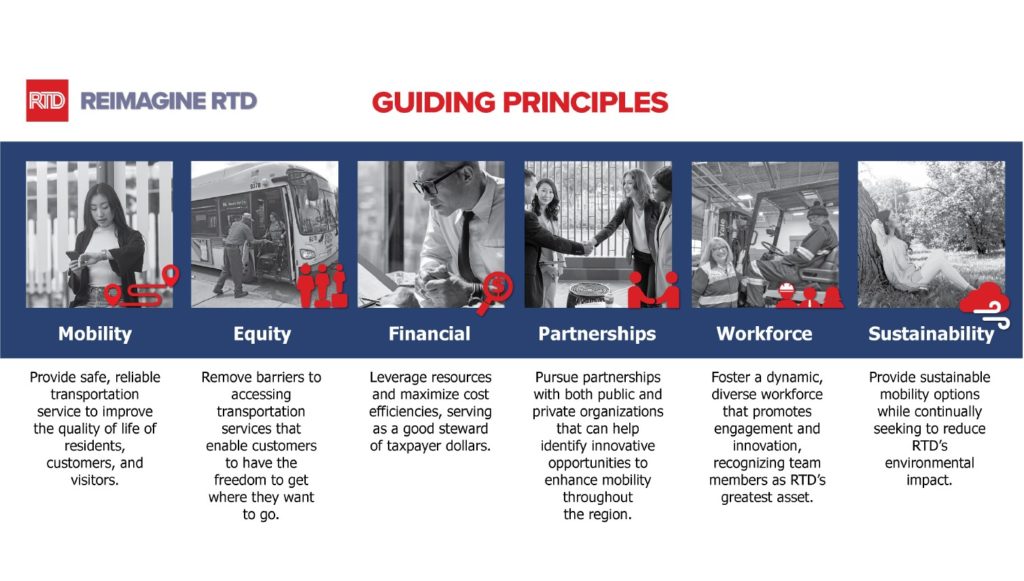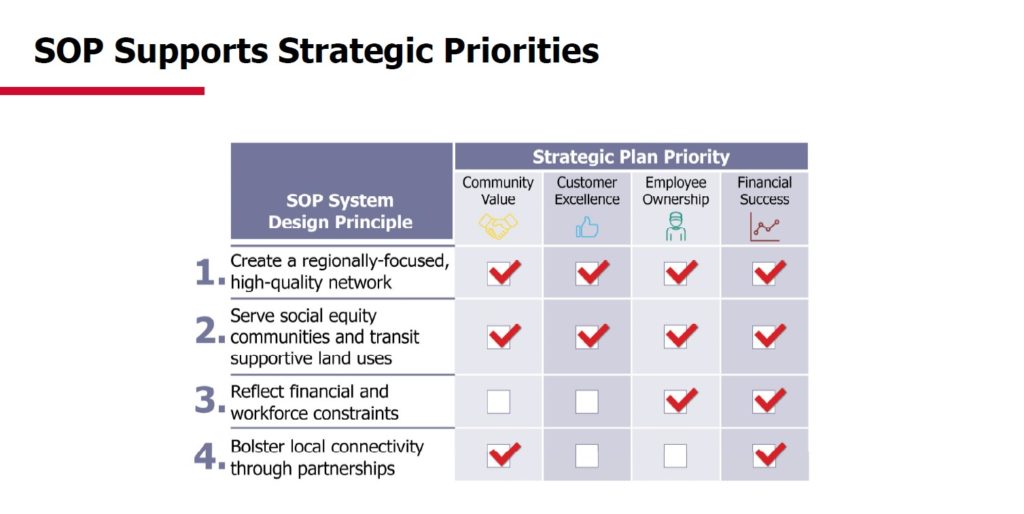Denver’s Regional Transportation District (RTD) has to make some tough choices as they slice up a tiny pie of funding for transit in Denver. Funding and labor challenges, all reinforced by the impacts of the COVID-19 pandemic, put RTD in a tough position. We think the criteria they are using to evaluate trade-offs of cost and service—putting people and equity first—are exactly right. We also must grow the pie of funding to provide the great transit that Denverites need and deserve. Now is an important time for you to weigh in on key decisions RTD is making that will affect our region for years to come—read on!
Since late 2019 (with a brief hiatus in 2020 due to COVID-19) RTD has been working to create a long-term vision for the agency through the Reimagine RTD process. The two outcomes of the process will be a near-term System Optimization Plan and a longer-term visionary Mobility Plan for the Future.
A draft of the System Optimization Plan (SOP) was released recently and RTD is currently accepting feedback until February 9, 2022.
Quick preview before we give you some more background and our take on the SOP
- View a presentation of the draft SOP
- Provide feedback on a map based tool (you may want to watch this explainer video first)
- Spoiler alert: Join us in supporting the SOP by sending a quick email to the project team.
- You can also email feedback directly to the project team at communityengagement@rtd-denver.com or you can call them at (303) 489-7792
- CPR’s Coverage: RTD proposes massive overhaul: Fewer suburban buses, more service where riders remained during the pandemic
- City Cast Denver: Why is RTD “Dramatically” Overhauling Bus Routes Now?
What’s an SOP and why is RTD going through this process?
The SOP is a comprehensive review and refinement of RTD’s service. With the Reimagine RTD guiding principles, the SOP design principles, and a focus on equity and prioritizing transit dependent riders in mind, RTD developed the SOP to address changing travel patterns, increase ridership, improve performance, and ensure fiscal sustainability. The draft SOP represents the 2027 route network and will guide service growth decisions between now and then. As you’ll see, RTD has had to make tough decisions about where they invest their limited resources, especially in light of the impacts from the COVID-19 pandemic.
Above: The RTD Guiding Principles
Above: How the SOP system design principles support RTD’s strategic priorities.
Take a look at this presentation of the draft SOP and how it impacts specific routes. You can also use this map based tool to view route changes and provide feedback.
Our take on the SOP
Given RTD’s current funding and labor limitations, we are glad that RTD has undertaken the SOP and believe that the guiding principles are the right ones.
We agree with RTD Board Director Shontel Lewis, who in this CPR article said “the plan shows RTD is ‘prioritizing equity — and not in words, but in action…It’s probably gonna be a painful and uncomfortable experience. I think we have an opportunity to put our money in the places in which people are riding and to figure out other solutions where people aren’t.’”
DSP is committed to advocating for transit in Denver that is equitable, sustainable, supported by land use policies that foster density, safe, accessible, affordable, and reliable. The COVID-19 pandemic highlighted ridership patterns of people who rely most on public transit to get where they need to go and we are glad to see RTD prioritizing those folks and adhering to the Title VI Service Equity Policies. Given RTD’s limitations, we believe that this is the right decision-making philosophy.
Tough times means tough choices. We support the adoption of this SOP by the RTD Board of Directors. Join us by sending an email of support.
Looking beyond the SOP
But, tough times also require creative problem solving. The SOP is about making decisions for slicing a small pie, when in reality, we need a bigger pie to adequately serve the Denver metro region and meet our air quality, climate, access, and safety goals.
The 2027 service projected in the SOP falls well short of what we need to meet those goals. The two primary factors limiting RTD’s ability to expand transit service, at this point, are sustained operating funding and labor. Now more than ever we need leaders not just within RTD, but at the local, state, and federal levels to come to the table to get public transit back on track. As the saying goes, you get what you pay for, and the SOP makes it clear that we desperately need more funding to have a public transit system that meets our needs.


